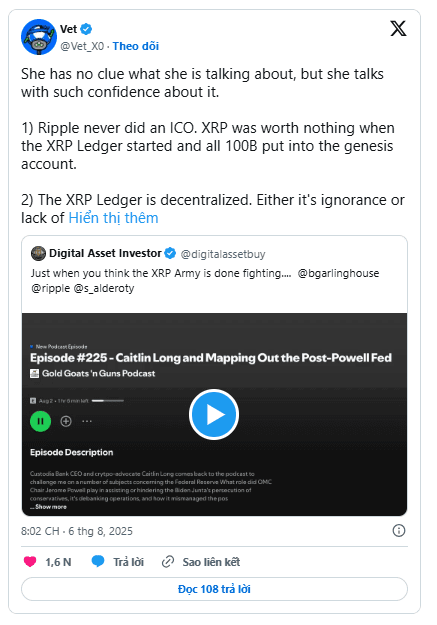Ripple's CTO, David Schwartz, publicly invited Custodia Bank CEO, Caitlin Long, to engage in a fact-based discussion about XRP, XRP Ledger (XRPL), and Ripple's stablecoin RLUSD.
Caitlin Long Challenges the Integrity of the XRP Ledger
In a recent appearance on the Gold Goats 'n Guns podcast, Caitlin Long made critical remarks about Ripple and its ecosystem. She questioned the decentralization of the XRPL, alleging that banks remain wary of the architecture of the XRP Ledger and have largely distanced themselves from the network.
Long also argued that Ripple's initial fundraising efforts resembled an ICO, a move she believes has undermined institutional trust.
In contrast, she asserted that Bitcoin and Ethereum only raised relatively modest amounts when they launched. She also claimed that the XRPL has not shown any significant development since its inception. Her comments came at a time when Ripple is actively pursuing a National Bank Charter and seeking a master account from the Federal Reserve to support RLUSD.
According to Long, this strategic shift signals an internal acknowledgment that the XRPL will not truly be able to replace SWIFT. She predicts that in any U.S. Treasury initiative to tokenize T-Bills, Ethereum will be the preferred platform due to its mature infrastructure and lack of need for licensing.
Schwartz's Response: "Let's Discuss the Facts"
In response, members of the XRP community rejected Long's claims. David Schwartz intervened, suggesting a dialogue based on verifiable information about Ripple's technology and roadmap.
Schwartz posted: "I am willing to discuss information related to Ripple, RLUSD, XRP Ledger, and XRP."
Schwartz also noted a theme written by Vet, a prominent community contributor of XRP, who has refuted several of Long's claims.
On the right track: Schwartz is not just talking about decentralization. CoinEdition previously reported on how he launched his own independent XRPL server.
The Community Defends the Heritage and Structure of XRP
Vet clarified that Ripple did not conduct an ICO. Instead, the entire supply of 100 billion XRP was created at launch and sent to a genesis account, unlike Ethereum's token sale, where investors exchanged Bitcoin for ETH.

When discussing the centralization story, Vet emphasized that the XRP Ledger operates on a decentralized validation model, with several independent individuals operating up to 1,000 nodes.
He also noted that Ripple is actively building on the XRPL, including the direct deployment of RLUSD on the ledger. Vet highlighted the development of the ledger over the years, pointing out that ongoing upgrades and technical modifications have enhanced its capabilities.
Another prominent voice, Mickle, also agreed with this view. He emphasized that the XRPL existed before XRP was publicly offered and reiterated that Ethereum holds the record for launching the first ICO.
Although many in the XRP community opposed Long's stance, her criticisms are not unique. They align with the views of many others in the cryptocurrency industry, including Ethereum co-founder Vitalik Buterin.
Why is this debate happening right now? Long is not the only one with this viewpoint. Below is our previous report on when El Salvador's Bitcoin advisor made a similar statement.

